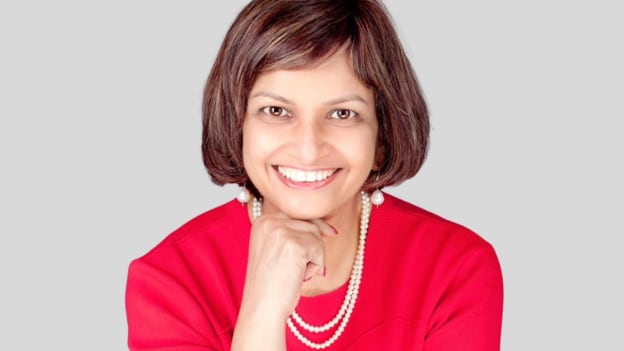The Modern CHRO with Mukta Arya

Nurturing a high-performance culture at Societe Generale is a challenge that CHRO Mukta Arya has embraced with creativity, agility and grace. It’s a blend of characteristics that sets her apart – and makes her an example of a modern-day CHRO.
The Hong Kong-based leader believes in the influence of culture on the success and longevity of a business. Her views signify a greater shift in the profession: providing value to the organisation by unleashing the potential of people and creating a nurturing, supportive and trusting environment.
Indeed, modern CHROs like Mukta are redefining their roles beyond administrative functions to become architects of the organisational ethos. Mukta ensures Societe Generale not only thrives in attracting top talent but also excels in engaging them meaningfully.
Here’s our exclusive interview:
What are some of the talent opportunities and challenges that you see in Asia Pacific, and what is Societe Generale’s secret to harnessing the potential of talent in the region?
The most important thing, I feel, is the culture. We can have the best products and the best processes, but if the culture is not conducive for an environment that is creative, humane, warm and caring, other things take a backseat.
What we try to do is create an environment with our managers – our managerial culture – with our people practices, with our leaders walking the talk. It’s an environment takes care of employees.
In the past few years, well-being has become a major topic in most organisations, but I think it is at the base of it. People come to work because they get their satisfaction – intellectual satisfaction, job satisfaction – but they also want to work with people who care for them, or people who are good, who they could relate to or talk to. I think the social nature of a workplace we cannot ignore.
For me, this is the most important USP for us: an environment where people can be together and create great things and [be] excellent at talent management or, my favourite part, succession planning, trying to figure out creative ways of making sure that we have business continuity. HR is not a static function.
We cannot rest on our laurels.
There are, of course, talks about agility in the talent and succession planning process. What I like is that things don’t remain the same. Sometimes you have unexpected scenarios. We have seen many of them in the past and we continue seeing them since people have their own priorities. People want to move around for different reasons. Sometimes it’s personal; sometimes it’s professional.
This makes the HR person, I think, much more dynamic, because we cannot rest on our laurels and say that, “Oh, we did this thing and now you can sit on it for one year and we don’t have to do anything else”.
It’s like every single day is a different day and is unexpected. So we need to really stretch our mind much more creatively to find solutions. That’s what makes talent management much more interesting because of the unpredictability, and I love it. It’s challenging. It’s tiring, sometimes. But it also gives a lot of satisfaction to me as an HR professional.
What do you think are the defining features of the modern CHRO in APAC? What are we doing well as business leaders?
I think in our region, in APAC, the modern CHRO is open-minded and willing to experiment. I think it’s really important that we are open to ideas. We’re not fixed with what we have been doing over the years.
We’re looking at what’s happening in the business, first of all, because we really need to align with it. Also, are we data driven and really making sense out of the data before we try to implement initiatives that will help the organisation go forward?
In a data-driven approach, we have tonnes and tonnes of data, but can we make sense out of it and really help managers make decisions and simplify [solutions]? The modern CHRO is somebody who loves simplification and not writing thousands of pages which nobody reads. They are somebody who can anticipate what is going to happen and then work on it.
The modern CHRO is open-minded and willing to experiment.
The modern CHRO is also tech-driven. Whatever age we may be, whether we’re a Baby Boomer, Generation X, Y, or Z, do we have the right balance of human touch and technology?
For me, the new breed of CHROs are relationship managers. Domain knowledge is very important – ou need to have the depth of knowledge of HR functions. But relationship management is equally important to know people and what’s going on, on the ground.
Are we able to connect to people at every single level? Not only the senior people but every single level? Do we understand generational differences? Are we able to connect with people from different generations? It’s extremely important that sensitivity is there in the modern CHRO.
And last, which is not a new concept, and I’m sure you have heard it thousands of times: it is really important to have the fine balance between being an employee champion and a management representative.
We have a dual role. We have to support employees, but we also have to see the interests of the organisation. So how do you really balance it out and be ‘the tightrope walker’? This is how I describe a modern CHRO and I see it in my role.
We need to balance our roles and be 'the tightrope walker'.
Sometimes, it’s not easy to walk the tightrope. You can go this side or that side quite easily. And there’s a lot of dilemmas we face every day as CHROs; when there are decisions to be made. We learn by doing. There’s trial and error. And sometimes, we have failures.
I have failed many times in my decisions, but I’ve also succeeded in some. This gives me hope to go forward.
It’s not an easy task. Even though sometimes people say that the HR role can be done by anybody, I still think it’s a very specialist role. I still think that it requires in-depth knowledge of the domain. It’s a balancing act.
What are some insights you've gleaned from your years of working to shape organisational culture?
For me, HR is a culture curator along with other managers. So, I would not say that it’s in isolation.
As a bank, we do have a number of things related to culture and conduct. This is not just a tick-the-box exercise. We ask, what are the right behaviours that employees can have?
Now, managers play a great role in this, but HR is there to support them to make sure that – when there are questions – we can answer them. When there are grey areas, we are able to really guide the managers to make the right decision. So for me, it’s an important role that we play as cultural curators.
HR is a culture curator but we do not work in isolation.
We also play a big role when we are hiring people. Are we, for example, courageous enough to say that – even if everybody liked a particular candidate – we saw that there was something [off] from a behavioural point of view? Are we going to raise it and make sure that we stick to certain decisions to be made? Do we have a voice? Are we speaking up?
Do we give the right advice so that managers can make the decision?
The perspective from HR can be very different. This is our value: we give a perspective on things that sometimes people in business do not see. They are coming from the business. The value we [in HR] bring is really a human side. And then we make a decision collectively.
So for me, as human resources, along with the various managers and leaders, we can make a major difference in the culture of an organisation. It's not us alone, but we work together with them to get it done.




